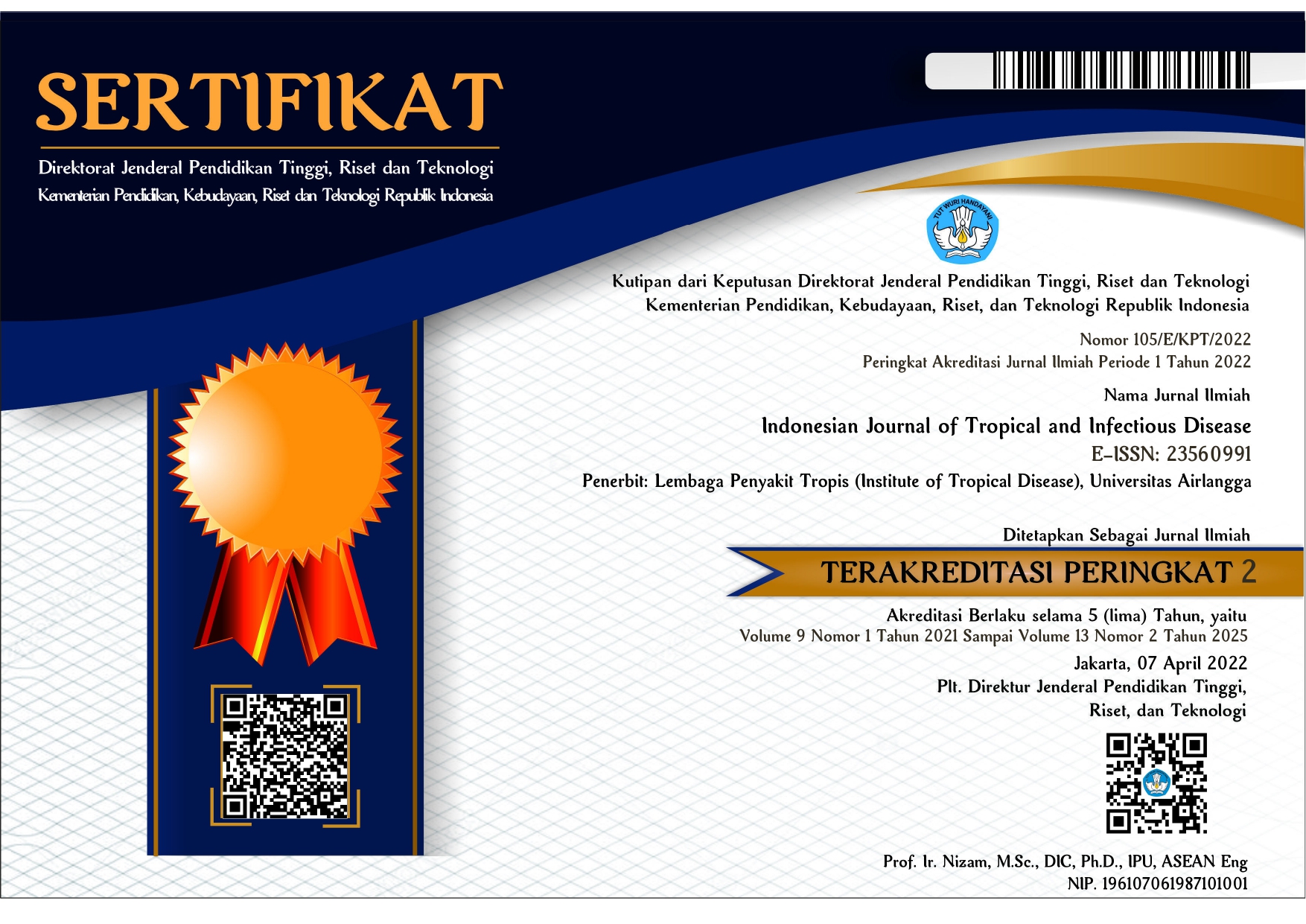Exploring the Therapeutic Potential of Glycyrrhizic Acid in Liver Implication in Dengue Infection: A Case Report
Downloads
Dengue is one of the most common infectious diseases affecting humans. The virus is transmitted between humans by the Aedes mosquito. It occurs hyperendemically in tropical and subtropical climates worldwide. Dengue infection can affect numerous organs, with the liver being the most frequently affected organ. The clinical spectrum of liver disorders ranges from mild elevation of transaminase enzymes to severe conditions such as acute liver failure. Several mechanisms have been proposed to describe hepatic dysfunction observed in dengue fever and dengue hemorrhagic fever, such as immunological injury, hypoxic injury, and direct viral damage due to reduced hepatic perfusion during shock. Glycyrrhizic acid, extracted in the form of glycyrrhizin from the root of the licorice plant Glycyrrhiza glabra, is referred to as Stronger Neo-Minophagen-C (SNMC®). It has shown effectiveness in reducing serum aminotransferase and bilirubin levels, attenuating hepatocyte apoptosis, and producing endogenous interferon. The following is a case report of a 23-year-old woman with dengue fever and elevated liver enzyme level. The patient's vital signs were stable. A physical examination revealed no abnormalities. A complete blood count test showed thrombocytopenia without an elevation of the hematocrit. AST level was 901"‰U/L after admission. Causes of other hepatitis infections, such as hepatitis A, B, and C, were excluded. The dengue IgM and IgG antibody levels were reactive. After several days of hospitalization, the patient experienced clinical improvement after supportive therapy and the administration of glicyrrhizic acid or SNMC®.
Murugesan A, Manoharan M. Dengue virus. In: Emerging and Reemerging Viral Pathogens: Volume 1: Fundamental and Basic Virology Aspects of Human, Animal and Plant Pathogens. Elsevier; 2019. p. 281–359.
World Health Organization. Regional Office for South-East Asia. Comprehensive guidelines for prevention and control of dengue and dengue haemorrhagic fever. World Health Organization Regional Office for South-East Asia; 2011. 196 p.
Bhatt S, Gething PW, Brady OJ, Messina JP, Farlow AW, Moyes CL, et al. The global distribution and burden of dengue. Nature. 2013 Apr 25; 496(7446):504–7.
Tsheten T, Clements ACA, Gray DJ, Adhikary RK, Furuya-Kanamori L, Wangdi K. Clinical predictors of severe dengue: a systematic review and meta-analysis. Vol. 10, Infectious Diseases of Poverty. BioMed Central Ltd; 2021.
Samanta J. Dengue and its effects on liver. World J Clin Cases. 2015; 3(2):125.
Guabiraba R, Besnard AG, Marques RE, Maillet I, Fagundes CT, Conceiçí£o TM, et al. IL-22 modulates IL-17A production and controls inflammation and tissue damage in experimental dengue infection. Eur J Immunol. 2013 Jun; 43(6):1529–44.
Thepparit C, Khakpoor A, Khongwichit S, Wikan N, Fongsaran C, Chingsuwanrote P, et al. Dengue 2 infection of HepG2 liver cells results in endoplasmic reticulum stress and induction of multiple pathways of cell death. BMC Res Notes. 2013;6(1).
Beltrán D, López-Vergès S. NK cells during dengue disease and their recognition of dengue virus-infected cells. Vol. 5, Frontiers in Immunology. Frontiers Media S.A.; 2014.
Girish C, Pradhan SC. Herbal Drugs on the Liver. In: Liver Pathophysiology: Therapies and Antioxidants. Elsevier; 2017. p. 605–20.
Savès M, Raffi F, Clevenbergh P, Marchou B, Waldner-Combernoux A, Morlat P, et al. Hepatitis B or Hepatitis C Virus Infection Is a Risk Factor for Severe Hepatic Cytolysis after Initiation of a Protease Inhibitor-Containing Antiretroviral Regimen in Human Immunodeficiency Virus-Infected Patients. Vol. 44. 2000.
Crance JM, Lévíªque F, Biziagos E, Van Cuyck-Gandr6 H, Jouan A, Deloince R. Studies on mechanism of action of glycyrrhizin against hepatitis a virus replication in vitro. Antiviral Res. 1994; 23:63–76.
Jung JC, Lee YH, Kim SH, Kim KJ, Kim KM, Oh S, et al. Hepatoprotective effect of licorice, the root of Glycyrrhiza uralensis Fischer, in alcohol-induced fatty liver disease. BMC Complement Altern Med. 2016 Jan 22; 16(1).
Xie C, Li X, Wu J, Liang Z, Deng F, Xie W, et al. Anti-inflammatory Activity of Magnesium Isoglycyrrhizinate Through Inhibition of Phospholipase A2/Arachidonic Acid Pathway. Inflammation. 2015 Aug 21; 38(4):1639–48.
Ali M, Khan T, Fatima K, Ali Q ul A, Ovais M, Khalil AT, et al. Selected hepatoprotective herbal medicines: Evidence from ethnomedicinal applications, animal models, and possible mechanism of actions. Vol. 32, Phytotherapy Research. John Wiley and Sons Ltd; 2018. p. 199–215.
Tan SS, Bujang MA. The clinical features and outcomes of acute liver failure associated with dengue infection in adults: A case series. Brazilian Journal of Infectious Diseases. 2013 Mar; 17(2):164–9.
Ling LM, Wilder-Smith A, Leo YS. Fulminant hepatitis in dengue haemorrhagic fever. Journal of Clinical Virology. 2017 Mar; 38(3):265–8.
Arunpriyandan V, Sundaresan KT. Fulminant Hepatic Failure in Dengue Fever Without Plasma Leakage: A Case Report. Cureus. 2022 Apr 9;
Paula Gomes Mourí£o M, Vinícius Guimarí£es de Lacerda M, Albuquerque de, Duarte Alecrim W. Dengue Hemorrhagic Fever and Acute Hepatitis: A Case Report. The Brazilian Journal of Infectious Diseases [Internet]. 2004; 8(6):461–4. Available from: www.bjid.com.br
Matsumoto Y, Matsuura T, Aoyagi H, Matsuda M, Hmwe SS, Date T, et al. Antiviral Activity of Glycyrrhizin against Hepatitis C Virus In Vitro. PLoS One. 2013 Jul 18; 8(7).
Hidaka I, Hino K, Korenaga M, Gondo T, Nishina S, Ando M, et al. Stronger Neo-Minophagen CTM, a glycyrrhizin-containing preparation, protects liver against carbon tetrachloride-induced oxidative stress in transgenic mice expressing the hepatitis C virus polyprotein. Liver International. 2017 Aug; 27(6):845–53.
Lin CC, Wang PH. Intravenous glycyrrhizin improved serum transaminases rapidly in a chronic hepatitis B patient with acute exacerbation. Journal of the Formosan Medical Association. 2015 Feb 1; 114(2):188–9.
Copyright (c) 2024 Indonesian Journal of Tropical and Infectious Disease

This work is licensed under a Creative Commons Attribution-NonCommercial-ShareAlike 4.0 International License.
The Indonesian Journal of Tropical and Infectious Disease (IJTID) is a scientific peer-reviewed journal freely available to be accessed, downloaded, and used for research. All articles published in the IJTID are licensed under the Creative Commons Attribution-NonCommercial-ShareAlike 4.0 International License, which is under the following terms:
Attribution ” You must give appropriate credit, link to the license, and indicate if changes were made. You may do so reasonably, but not in any way that suggests the licensor endorses you or your use.
NonCommercial ” You may not use the material for commercial purposes.
ShareAlike ” If you remix, transform, or build upon the material, you must distribute your contributions under the same license as the original.
No additional restrictions ” You may not apply legal terms or technological measures that legally restrict others from doing anything the license permits.























